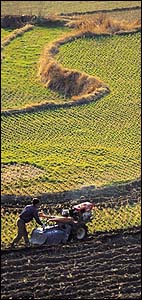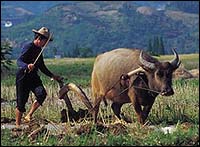Bible Study
New / Special
Jesus
Maturity
Encouragement
Good News
Church
Communion
Prayer
Christian Symbols
Scholarly Articles
Miscellany
Way of the Cross
Holidays
Christmas
Easter
Thanksgiving
Pentecost
St. Patrick's Day
New Year's Day
Steps to Peace with God
Year of St. Paul
About Us
Podcasts
Contact Us
Dr. Wilson's Books
Donations
Watercolors
Site Map
Christian Articles Archive
 As
I look to the New Year, two passages of Scripture challenge me to grow and change in the year to come. Both are spoken by Old Testament prophets to the people of Israel, who had become lazy, sloppy, and disobedient in their service of the Lord.
As
I look to the New Year, two passages of Scripture challenge me to grow and change in the year to come. Both are spoken by Old Testament prophets to the people of Israel, who had become lazy, sloppy, and disobedient in their service of the Lord.
"Break up your unplowed ground
and do not sow among thorns.
Circumcise yourselves to the Lord,
circumcise your hearts,
you men of Judah and people of Jerusalem...." (Jeremiah 4:3-4a)
"Sow for yourselves righteousness,
reap the fruit of unfailing love,
and break up your unplowed ground;
for it is time to seek the Lord,
until he comes
and showers righteousness on you." (Hosea 10:12)
These passages have in common the phrase, "Break up your unplowed ground." Just what does it mean for me and you to do that?
The phrase "unplowed ground" (NIV) or "fallow ground" (KJV, ESV, NRSV) is the Hebrew noun nîr, "the tillable, untilled, or fallow ground."* It is land that could be productive, but for whatever reason has not been broken up, tilled, plowed, and prepared for planting. The prophets speaking the Word of the Lord are commanding the people to break up that land -- spiritually! To plow the plowable land that they have. The prophets observe two things about fallow ground:
- Fallow ground is unusable, and
- Fallow ground is unused.
Let's examine each and then see how we can go about breaking up our own fallow ground.
Fallow Ground Is Unusable
 Unplowed ground won't let a crop grow. It is hard, preventing seeds from
penetrating, germinating, and growing to maturity. When it's time to put in the
garden we break up the soil so that seeds are able to get into it and let their roots go down deep where moisture can be found.
Unplowed ground won't let a crop grow. It is hard, preventing seeds from
penetrating, germinating, and growing to maturity. When it's time to put in the
garden we break up the soil so that seeds are able to get into it and let their roots go down deep where moisture can be found.
In our first passage, Jeremiah tells his hearers:
"Break up your unplowed ground
and do not sow among thorns." (Jeremiah 4:3)
In other words, they were sowing seed, but because they didn't bother to prepare the soil and pull out the thorns, the seed had little effect. They were either lazy or stupid or both.
When you apply this agricultural analogy to spiritual things, what must be done so the soil is ready for planting God's word?
Stumps must be removed
. As American pioneers moved West, they began by logging the trees on their land and rooting out the stumps. Have you ever cut down a tree and prepared its trunk for construction or firewood? It's hard work. But removing stumps is even harder. You must dig down and cut each of the main roots with an axe, hatchet, or chainsaw. Then you attach a rope or chain to the stump and pull it out with a team of horses, oxen, truck, tractor, or winch. Finally, you pile all the stumps together and burn them as you clear the land.What has been growing in your heart previously? Hatred, bitterness, lust, greed, hedonism? These must be rooted out so a new crop can be planted. Grain doesn't flourish under the shade of trees. They must be removed so the new crop can grow in the light.
Hardness must be broken up.
A plow does the hard work of opening up the ground. Yes, you can dig it, one shovel at a time, but that's too slow. You harness some cattle or horses -- or horsepower in mechanized equipment. But many is the farmer without livestock who has harnessed himself up and pulled his own plow while his wife or son guided the plow. It takes energy to pull the plow, to guide the plow, to keep the furrows straight so the field can be plowed efficiently.Where is the hardness in your heart? Where is the unbelief that is lurking in your soul? If you've been hurt in a relationship or by your father or mother, you may have sealed off an area of your life because it's just too painful to revisit it. But you need to let God break up those old resentments and heal those old hurts. He'll pull the plow, but you must direct it toward those hard places in you that you know must be dealt with.
Sometimes we've been hardened by unbelief. You prayed that a grandparent wouldn't die and your prayer wasn't answered. You've been out of work or have chronic illness that has taken its toll on your faith. You've come to the conclusion that God doesn't answer prayer -- at least for you. That hardness of unbelief must be faced squarely and broken up if God is to plant something new and fruitful in your heart. Heartfelt repentance and confession is one way of plowing deep. When is the last time you were literally on your knees broken before the Lord?
Larger rocks must be dislodged.
Sometimes when you're plowing you come upon some large, immovable rocks. If you're serious about putting this field into production, it will require considerable digging, leverage, and horsepower to move the rocks from the field. Maybe even blasting powder. Yes, it is hard work, but you'll be glad later that you took the time to do it right.As you've plowed your heart, have you discovered some big rocks that need to be removed? Can't budge them by yourself? Why don't you talk with your pastor or a mature Christian about the problem? They will have had some experience moving rocks in their own life -- every field has them. Instead of being judgmental, you'll probably find they'll be a lot of help.
Thorns must be gathered and burned
. When a field goes unplanted for several years it often become covered with thorns or other weeds. Here in California the weed of choice is star thistle (Centaurea solstitialis), an Old World thistle that is the scourge of the West. A combination of approaches will eventually conquer star thistle -- pulling by hand, mowing when the flowers are only 10% blossomed, and irrigation. One of our neighbors was in her pasture several days last month pulling star thistle up by the roots. Now her pasture is pretty free of it, though she'll need to watch out for newly germinated seeds for the next few years.What kinds of thorns make the fields of our hearts unproductive? In the Parable of the Sower, Jesus' uses thorns in a field to describe obstacles in the human heart.
"The one who received the seed that fell among the thorns is the man who hears the word, but the worries of this life and the deceitfulness of wealth choke it, making it unfruitful." (Matthew 13:22)
"The worries of this life, the deceitfulness of wealth and the desires for other things come in and choke the word, making it unfruitful." (Mark 4:19)
"The seed that fell among thorns stands for those who hear, but as they go on their way they are choked by life's worries, riches and pleasures, and they do not mature." (Luke 8:14)
Depending on your particular plot of land, those thorns may represent sexual temptations and lust, self-indulgence, pride, anger, selfishness, a love of entertainment and recreation, addictions, greed, and other thorns. Each of these thorns can choke the Word. Each has a devastating effect on the crop that God wants to grow in you and me. We must root them out instead of going easy on them!
Fallow ground, unplowed, unprepared soil is unusable for any serious crop. God speaks to us that we must "break up" our fallow ground so that it is usable.
Fallow Ground Is Unused
But there's another side to this. Fallow ground is unused ground. You may have many aspects of your life surrendered to God and under cultivation for a crop of righteousness and the fruit of the Spirit. And that is good! But maybe there's a plot of land -- a part of your life -- that you've never got around to cultivating, planting, and harvesting. It's there, but it's wasted. Perhaps you've put off plowing this particular piece of land because it's too difficult or too painful. Perhaps you can't envision the fruit and grain that can grow there so you've never bothered.
But God is the great Vinedresser. If you'll break up the additional fallow ground in your life, he will extend and enlarge your fruitfulness.
Looking ahead to a New Year is a great time to rededicate the tracts of land that comprise our life and put them under cultivation for God. Now is the time to break up these unplowed fields and yield them to his growth. He calls you to this. Will you be obedient? Here is your command and your promise:
"Sow for yourselves righteousness,
reap the fruit of unfailing love,
and break up your unplowed ground;
for it is time to seek the Lord,
until he comes
and showers righteousness on you." (Hosea 10:12)
*R. Laird Harris (editor), Theological Wordbook of the Old Testament (Moody Press, 1980), #1360a.


 To be notified about future articles, stories, and Bible studies, why don't you subscribe to our free newsletter, The Joyful Heart, by placing your e-mail address in the box below. We respect your
To be notified about future articles, stories, and Bible studies, why don't you subscribe to our free newsletter, The Joyful Heart, by placing your e-mail address in the box below. We respect your